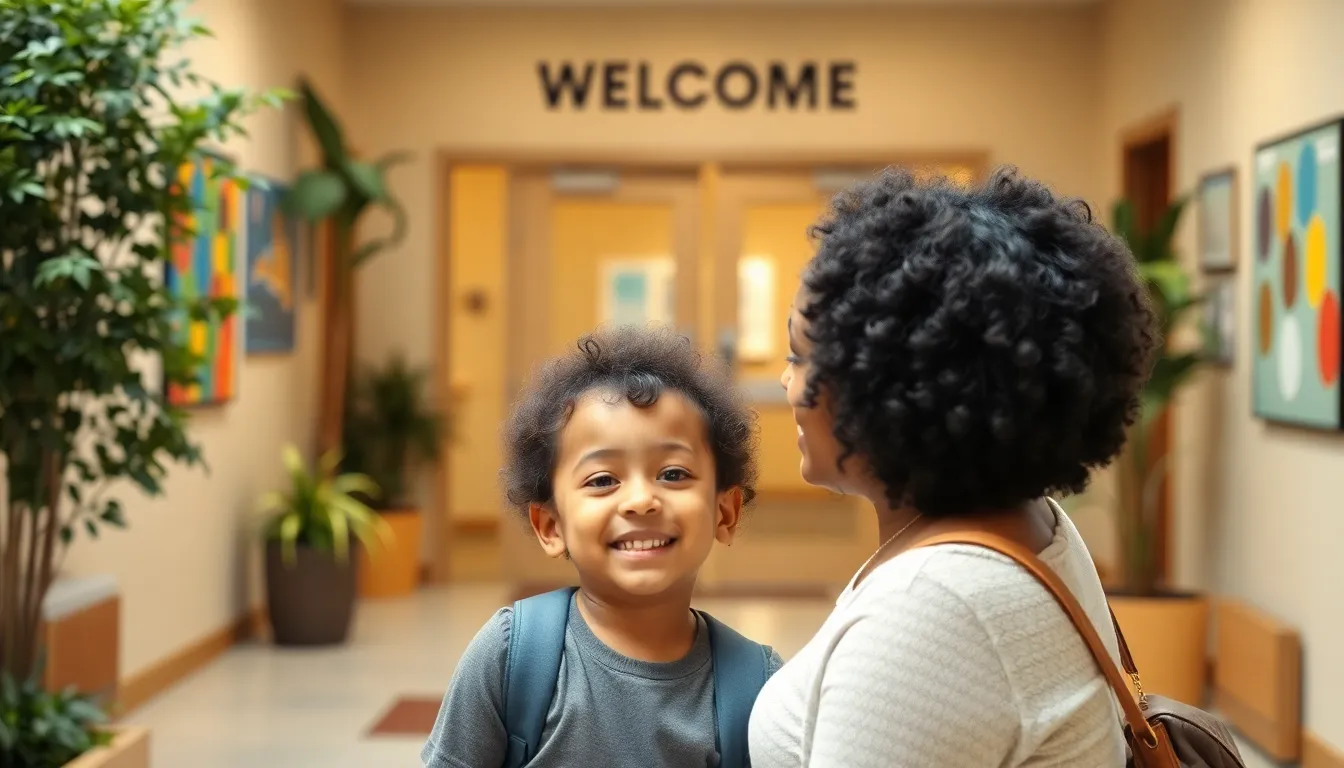Table of Contents
ToggleFinding the right inpatient child mental health facility can feel like searching for a needle in a haystack—if that needle was also a unicorn and the haystack was on fire. Parents want the best for their kids, especially when it comes to mental health. With so many options out there, it’s crucial to know where to turn when the going gets tough.
Overview of Inpatient Child Mental Health Facilities
Inpatient child mental health facilities provide specialized care for children facing severe emotional and psychological challenges. These environments often focus on stabilization, assessment, and treatment. Experts typically staff these facilities, offering comprehensive care plans tailored to individual needs.
Child mental health facilities can address a variety of issues, including depression, anxiety, behavioral disorders, and trauma-related conditions. Each facility typically features structured programs that include therapy sessions, educational support, and recreational activities. Families often find that a supportive and safe environment fosters healing and growth.
Facilities incorporate evidence-based therapeutic techniques that enhance emotional regulation and coping skills. Multidisciplinary teams evaluate children’s conditions and adjust treatment plans accordingly. Parents frequently benefit from family therapy sessions, allowing them to engage in their child’s recovery process.
Location plays a crucial role in accessibility to inpatient facilities. Proximity to home can ease the transition for both families and children. Many facilities strive to create a welcoming atmosphere that minimizes stress and encourages participation in therapeutic activities.
Availability of resources varies among facilities. Some may offer specialized offerings such as art therapy, music therapy, or cognitive behavioral therapy. Parents should explore multiple options, visiting each facility to determine the best fit for their child’s unique needs.
Assessing the aftercare plan is essential when selecting an inpatient facility. Continued support after discharge can significantly impact a child’s long-term success. Parents often seek facilities that provide connections with outpatient services and community resources.
Importance of Local Facilities

Local inpatient child mental health facilities play a crucial role in providing necessary support. Proximity to home eases access to care for families during challenging times.
Access to Care
Accessing mental health care becomes simpler when facilities are nearby. Parents can visit their children more frequently, enhancing emotional support during treatment. Shorter travel times reduce stress and allow for greater family involvement in the healing process. Research shows that local facilities often feature shorter wait times for admission, facilitating quicker access to critical resources. Families experience fewer logistical challenges, which can significantly impact overall treatment success.
Community Resources
Community resources significantly enhance the effectiveness of local facilities. Many inpatient centers collaborate with schools, therapists, and support groups to create a comprehensive network. Such resources provide continuity of care after discharge, ensuring that children transition smoothly back to everyday life. Access to community events and programs also fosters social connections, aiding in child development. Local support groups offer additional assistance for parents navigating their child’s mental health journey.
Types of Treatments Offered
Inpatient child mental health facilities offer diverse treatment options tailored to individual needs. Each type of treatment focuses on the specific challenges faced by children.
Therapeutic Approaches
Evidence-based therapeutic approaches play a vital role in inpatient treatment. Cognitive-behavioral therapy (CBT) helps children identify and change negative thought patterns. Dialectical behavior therapy (DBT) emphasizes emotional regulation and interpersonal skills. Group therapy sessions foster peer connections, which support sharing experiences and coping strategies. These therapies often include parental involvement, ensuring families understand the healing process. Recreational therapy utilizes engaging activities to improve mental health in a supportive environment.
Specialized Programs
Specialized programs address unique mental health concerns effectively. Programs focusing on trauma provide targeted interventions for children affected by adverse experiences. Additionally, facilities may offer programs designed for children with autism, helping them navigate social interactions and emotional challenges. Some facilities develop academic support programs to ensure educational progress during treatment. Creative arts therapies, such as music and art therapy, enhance self-expression and emotional exploration. Structured daily routines integrate therapeutic activities, ensuring a comprehensive approach to mental wellness.
Factors to Consider When Choosing a Facility
Selecting the right inpatient child mental health facility requires careful consideration of several key factors. Parents should prioritize professional accreditation, staff experience, and the facility’s overall approach to care.
Accreditation and Licensing
Accreditation from recognized organizations ensures facilities meet specific standards of care. Most reputable centers hold licenses issued by state health departments or mental health boards. Confirming a facility’s accreditation guarantees it adheres to best practices in child mental health treatment. Facilities accredited by the Joint Commission or the National Committee for Quality Assurance reflect a commitment to safety and quality. Verification of these credentials provides peace of mind during a challenging time, reinforcing parents’ confidence in the care their child will receive.
Staff Credentials and Experience
Qualified staff members are crucial for effective treatment in inpatient settings. Expert clinicians, psychologists, and licensed therapists often form the core of the treatment team. Understanding the experience and educational background of the staff helps parents ensure their child receives appropriate care. Experts with specialized training in child and adolescent mental health can offer targeted interventions. Many facilities provide opportunities for parents to meet staff members, allowing firsthand insights into their qualifications and approaches. Enhanced communication between parents and team members supports a collaborative treatment environment.
Patient and Family Experiences
Parents often report mixed experiences while navigating inpatient child mental health facilities. Families emphasize the comfort of staff members who provide empathetic support. Children generally appreciate the structured routines that help ease their anxiety.
Parents note significant improvements in their child’s well-being during their stay. They appreciate that multidisciplinary teams work collaboratively, ensuring each aspect of care is addressed. Families also find engagement in treatment crucial, as it fosters a deeper connection to the healing process.
Children frequently express feelings of belonging through participation in group therapy. Peer connections formed in these settings often play a vital role in reducing feelings of isolation. Families observe that activities, such as creative arts therapies, encourage self-expression and healing.
Communication with clinical staff forms a critical part of the family experience. Frequent updates help families feel involved and informed about their child’s progress. Parents highlight the importance of having scheduled family therapy sessions, which strengthen bonds and improve understanding of mental health challenges.
Many families value the focus on aftercare planning to maintain progress post-discharge. Care coordinators assist in linking families to community resources and outpatient services. Proximity to local support groups emerges as a significant advantage, aiding transitions back into daily life.
Each child’s unique needs are taken into consideration, allowing for tailored treatment plans that adjust as necessary. Families express gratitude for therapeutic techniques grounded in evidence-based practices. Overall, experiences in these facilities underline the importance of a supportive environment and comprehensive care.
Finding the right inpatient child mental health facility is crucial for ensuring a child’s well-being. Local options provide not just immediate care but also a supportive environment where children can thrive. The proximity to home fosters family involvement and minimizes stress during treatment.
Parents should prioritize facilities that emphasize comprehensive care, qualified staff, and strong aftercare plans. Engaging with community resources can enhance the overall treatment experience and support children in their transition back to everyday life. By taking these steps, families can navigate their child’s mental health journey with confidence and hope for a brighter future.





